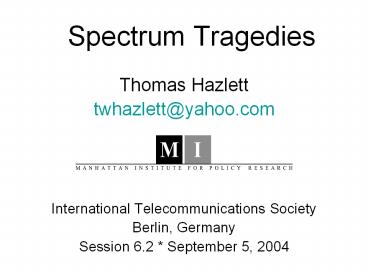Spectrum Tragedies - PowerPoint PPT Presentation
1 / 19
Title:
Spectrum Tragedies
Description:
Heller (1998) Moscow storefronts & kiosks. In reality, same general phenomenon ... Clearwire got its start in the wireless business using 2.4 GHz unlicensed ... – PowerPoint PPT presentation
Number of Views:30
Avg rating:3.0/5.0
Title: Spectrum Tragedies
1
Spectrum Tragedies
- Thomas Hazlett
- twhazlett_at_yahoo.com
- International Telecommunications Society
- Berlin, Germany
- Session 6.2 September 5, 2004
2
Common Interest Tragedies
- Tragedy of the Commons
- not enough ownership
- Over-utilization
- Tragedy of the Anti-commons
- too much ownership
- Under-utilization
- Heller (1998) Moscow storefronts kiosks
- In reality, same general phenomenon
- Lee Ann Fennell (2004)
3
Busy Sidewalks, Vacant Storefronts
4
Multiple Spectrum Tragedies
- MMDS license fragmentation
- Textbook anti commons
- WISPs excessive entry
- Textbook commons
5
Brisk Wireless Business (kiosks)
- CMRS ? 189 MHz
- 90 billion in annual revenue
- Consumer surplus 80 billion per year
- CS/PS gt 10
6
Economic Activity Across Bands (2003, USA)
Band MHz Service Rev. Rev. Equipment Network Capex
1.9 GHz 20 0 0 0
900 MHz, 2.4 GHz 26 83.5 0.03 billion 3.81 billion 0.5 billion
5 GHz 555 MHz 0 0 0.02 billion
800 MHz, 1.9 GHz 189 MHz 88 billion 13 billion 21 billion
7
MMDS/ITFS
- 190 MHz _at_ 2.5 MHz
- Dispersed ownership
- Many non-profits
- Adjacent interference problems gt hold-up
- Licenses sell _at_ 99 discount from CMRS
8
Deinterleaving
9
Tragedy in Licensed Spectrum
- Exclusive use rights assigned
- But with extreme fragmentation
- Little social value produced
- Tragedy of anticommons (under use)
- Tragedy of the commons (reform is public good)
10
Coordination of Unlicensed Use
- Government allocation rules
- Power limits
- Technical standards
- Service categories
- Property owners
- IT departments
- Vertically integrated users
- Technology vendors
11
Commons Relatively Useful for?
- Corporate/campus
- Rules imposed by institution (Intel, CMU)
- Spectrum within the walls
- Baby monitors, cordless phones/PCs
- Rural WISPs
- Point to point (beams)
12
Commons Relatively Unsuccessful for ?
- Wide Area Networks
13
Coordination by Part 15 Rules
- Wireless Internet Service Providers (WISPs) are
using unlicensed spectrum to provide innovative
services in rural areas but are finding it
difficult to provide adequate signal coverage
because of our current Part 15 power limits. - SEPARATE STATEMENT OF COMMISSIONER KEVIN J .
MARTIN - Re Facilitating Opportunities for Flexible,
Efficient, and Reliable Spectrum Use Employing
Cognitive Radio Technologies (ET Docket No.
03-108) Authorization and Use of Software
Defined Radios (ET Docket No. 00-47), Notice of
Proposed Rulemaking and Order (Dec. 30, 2003).
14
Unlicensed WISPs on Scarcity
- This is not just coffee shop WiFi we are
discussing These services are part of the
infrastructure of our communities now on a
worldwide scale. The aggressive adoption of these
bands has come with little protections to WISPs
and their high profile customers and is in danger
of creating a disastrous implosion if nothing is
done to remedy the impending interference hazards
on the horizon. WISPs have no rights to the
spectrum they use
15
Property Rights
- I want to suggest a policy to help solve these
issues and provide unlicensed use of this band
simultaneously. I propose a new policy called the
WISP Homestead Policy Homestead status would be
given to WISPs who register with the FCC and
provide documentation proving active use - John Scrivner, Mt. Vernon. Net, Inc., WISP
Homestead Policy Proposal For WISP Use of the
ITFS Band, Comment filed with Federal
Communications Commission, WT 03-66 (March 19,
2004).
16
Spectrum Coordination Costs
- LANs ? low
- WANs ? high (many potential conflicts)
- Efficient market organization is to pay an agent
to coordinate - Wireless networks with EAFUS rights invest in
complementary infrastructure to increase value of
spectrum
17
Spectrum Sharing to Introduce New Technology
18
Wheres McCaw?
- Clearwire got its start in the wireless business
using 2.4 GHz unlicensed spectrum in several
markets. The company decided to sell its
businesses in several markets and switch to using
licensed spectrum in Jacksonville because thats
where the future and all the new technology is,
according to White. - Annie Lindstrom, Carrying the MDS/ITFS Torch,
Shorecliff Comm Mag (Sept/Oct 2003).
19
Conclusion
- Extreme fragmentation of Licensee rights
dissipates value of Licensed Spectrum - Extreme fragmentation of Use rights in Unlicensed
- Is compatible with short-range applications
- Is difficult to overcome for wide area
applications

